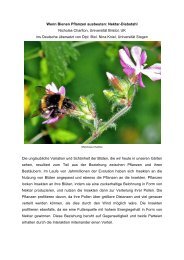PhDâ€theses - Ethologische Gesellschaft
PhDâ€theses - Ethologische Gesellschaft
PhDâ€theses - Ethologische Gesellschaft
Create successful ePaper yourself
Turn your PDF publications into a flip-book with our unique Google optimized e-Paper software.
THE INFLUENCE OF EARLY ENVIRONMENT ON LATER LIFE ‐ PHYSIOLOGY, BEHAVIOUR<br />
AND EVOLUTION<br />
Alexander Kotrschal<br />
alexander.kotrschal@ebc.uu.se<br />
Research Update<br />
PhD Thesis, 2010, supervised by PD Dr. Barbara Taborsky, Behavioural Ecology, Institute of Ecology<br />
and Evolution, University of Bern, Switzerland<br />
Current affiliation: Animal Ecology, Evolutionary Biology Centre, Uppsala University, Sweden.<br />
Phenotypic plasticity is a universal feature of organisms. Environmentally induced parental<br />
effects represent a form of phenotypic plasticity spanning generations. There is rapidly<br />
growing evidence that the environmental conditions experienced by females around<br />
reproduction can influence offspring phenotype in plants and animals. However, even<br />
environmental conditions experienced long before reproduction during the juvenile period<br />
of females can mediate crucial life‐history traits. Females of the cichlid fish Simochromis<br />
pleurospilus are known adjust offspring size in response to own juvenile nutrition. We tested<br />
whether these condition enable them to predict the postnatal conditions of their offspring<br />
better than the current conditions do, which requires certain conditions of habitat<br />
variability, distribution of juveniles and adults and gene flow between populations to hold.<br />
By combining detailed ecological and population surveys with fine‐scaled population<br />
genetics we confirmed that these requirements hold for our study species in their natural<br />
environment. Next we investigated the physiological consequences for juveniles of growing<br />
up in poor or rich environments and found a persistent alteration in metabolic rate and food<br />
conversion efficiency. In preparation of this study we developed a non‐invasive method to<br />
determine fat storage to be used in small, live fish. This technique estimates fat based on<br />
measures of swim bladder size, and predicts visceral fat content better than available<br />
morphometric condition indices. Besides physiology, we detected that the early nutritional<br />
conditions also affect learning abilities. Unexpectedly, the absolute amount of food did not<br />
affect learning. Instead we found that a single ration switch experienced by juveniles<br />
enhanced their learning abilities both as juveniles and as adults (Kotrschal & Taborsky,<br />
2010a). This appears to represent an adaptive strategy, as higher cognitive abilities may<br />
confer a survival advantage in variable environments. Overly fast growth during a specific,<br />
short time window during the development negatively influenced adult learning abilities,<br />
however. Although it was not possible to test mating preferences in dependence of early<br />
nutrition, we detected that our study species has a very peculiar mating system which<br />
posses features of both resource defence mating systems and exploded leks: The<br />
distribution of males, females and resources clearly resembles leks. Male territory defence,<br />
however, seems to enhance the quality of resources and thus generates critical resources for<br />
females, which attracts females in the vicinity of courting males (Kotrschal & Taborsky,<br />
2010b).<br />
Kotrschal, A. & Taborsky, B. 2010a. Environmental change enhances cognitive abilities in fish.<br />
PLoS Biology 8: e1000351.<br />
Kotrschal, A. & Taborsky, B. 2010b. Resource Defence or Exploded Lek ‐ A Question of<br />
Perspective. Ethology 116: 1‐10.<br />
8



